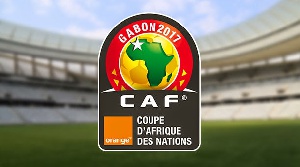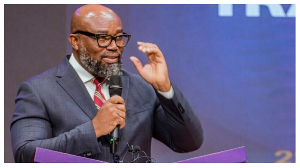There is the National Assembly, still bearing the scorch marks from the attempts of protesters – who refused to believe that the incumbent president, Ali Bongo Ondimba, had defeated the challenger Jean Ping – to burn it down.
There is the National Assembly, still bearing the scorch marks from the attempts of protesters – who refused to believe that the incumbent president, Ali Bongo Ondimba, had defeated the challenger Jean Ping – to burn it down.
There is Ping’s campaign headquarters, its windows broken and its walls dimpled with bullet holes after the army opened fire on demonstrators. The government has said that seven people died during the protests, but independent assessments suggest that 27 is a more realistic figure. Eyewitnesses speak of having seen a lot of blood on the floor.
Then there is the strange, half-finished Stade Omar Bongo, named after Ali’s father, who was Africa’s longest-serving head of state when he died in 2009. It should have been the centrepiece of the 2017 Africa Cup of Nations, but it stands as an unused $220m monument to a football tournament that has been greeted with ambivalence. Games have been held instead at the Stade de l’Amitié, several miles to the north of the city centre (the friendship in question being that between Gabon and China), completed to host the 2012 Cup of Nations, which Gabon co-hosted with Equatorial Guinea.
As the anger and violence of the protests died away after the Gabon Supreme Court’s decision to ratify the election result, despite the doubts of EU observers, focus shifted to the Cup of Nations. A leaked budget that the government has not denied put the cost at $770m: an extraordinary sum in a country that is struggling with escalating levels of public debt (now at more than 40 per cent of GDP). Spending on education and health care was cut in October.
Ping is opposed to the tournament, as he made clear when we met at his home, five minutes’ walk from his campaign headquarters. “There are not enough schools, classrooms. Even chairs they do not have,” he said. “How can you invest in stadiums when you are facing such big problems?”
Many in the opposition called for a boycott, but Ping did not, maintaining the low profile that he has kept since returning to Gabon from France at the end of November.
''The [Cup of Nations] is about 54 countries,” he said.
''We should not punish the others for our internal problems.” However, Ping declared that the tournament had been “a total failure for the young man” – his preferred term for Bongo, who will be 58 on 9 February.
An opposition newspaper ran the headline “Le grand flop!” after the opening ceremony, which took place in front of a crowd of a few hundred people. Not long into Gabon’s opening game against Guinea-Bissau, however, the 38,000-capacity Stade de l’Amitié was about 80 per cent full. A demonstration scheduled to be held at the same time never materialised, but four Ping supporters were arrested for protests in the city centre during Gabon’s second match. They were released on bail a week later but still face public disorder charges.
There has been less overt enthusiasm for the tournament than five years ago but there is little substance to opposition claims that low attendances are evidence of a boycott. Crowds at Cup of Nations games that don’t involve the host nation are always small; if anything, because of the large Malian, Senegalese and Burkinabe communities in Gabon, attendance has been good.
“The tournament has come at the right time,” said Prime Minister Emmanuel Issoze-Ngondet, who was appointed in September after the ratification of the presidential election result. “It will help people forget.” They might have forgotten rather more had Gabon not gone out in the group stage.
Over dinner, Issoze-Ngondet was adamant that the out-of-town stadiums in Oyem and Port-Gentil would prove economically viable as Libreville expands. He also insisted that the government remains open to negotiation with the opposition, pointing out that Ping – who was a long-time member of the ruling Gabonese Democratic Party and served as foreign minister under Omar Bongo (and has children with his daughter, Ali’s half-sister Pascaline) – barely differs ideologically from the president. “It is not economics or politics,” he said. “It is personal.”
One of the major differences between Bongo and Ping is their attitudes to ecology. Bongo has overseen the development of a national parks programme under the Manchester-born ecologist Lee White, which has led to thousands of ivory poachers being expelled from the north of the country. White has acknowledged that it would have been “catastrophic” to his work if Ping had won.
However good a Bongo regime may be for the wildlife in Gabon, it is a side issue beside the disputed vote and its bloody aftermath. An EU report into the election highlighted “significant weaknesses in the electoral process”, but Issoze-Ngondet dismissed the European delegation as “biased”. He hinted that French forces may have been working against the Bongo government and also suggested that when the Shell onshore oil concession is sold, it would likely go not to the Anglo-French company Perenco but to the US-based Carlyle Group.
For now, an uneasy peace holds. Two months ago, Ping met UN representatives in Washington and was warned that if he didn’t maintain a dialogue with Bongo, the result could be civil war. “You are paid to avoid civil war,” he told them, “and you are trying to subcontract. Do your job – don’t ask me to do it for you!”
Although there is a sense that the momentum behind his anti-Bongo coalition is waning, Ping’s rhetoric remains tough. He insisted that he will “never, ever” return to government while Bongo is in power. ''Dialogue is a good thing, but you are not solving the problem. The problem is Ali.''
Perhaps so, but this seems to confirm Issoze-Ngondet’s assertion that the battle is now one of personalities rather than ideology.
Opinions of Sunday, 5 February 2017
Columnist: www.ghanasoccernet.com















